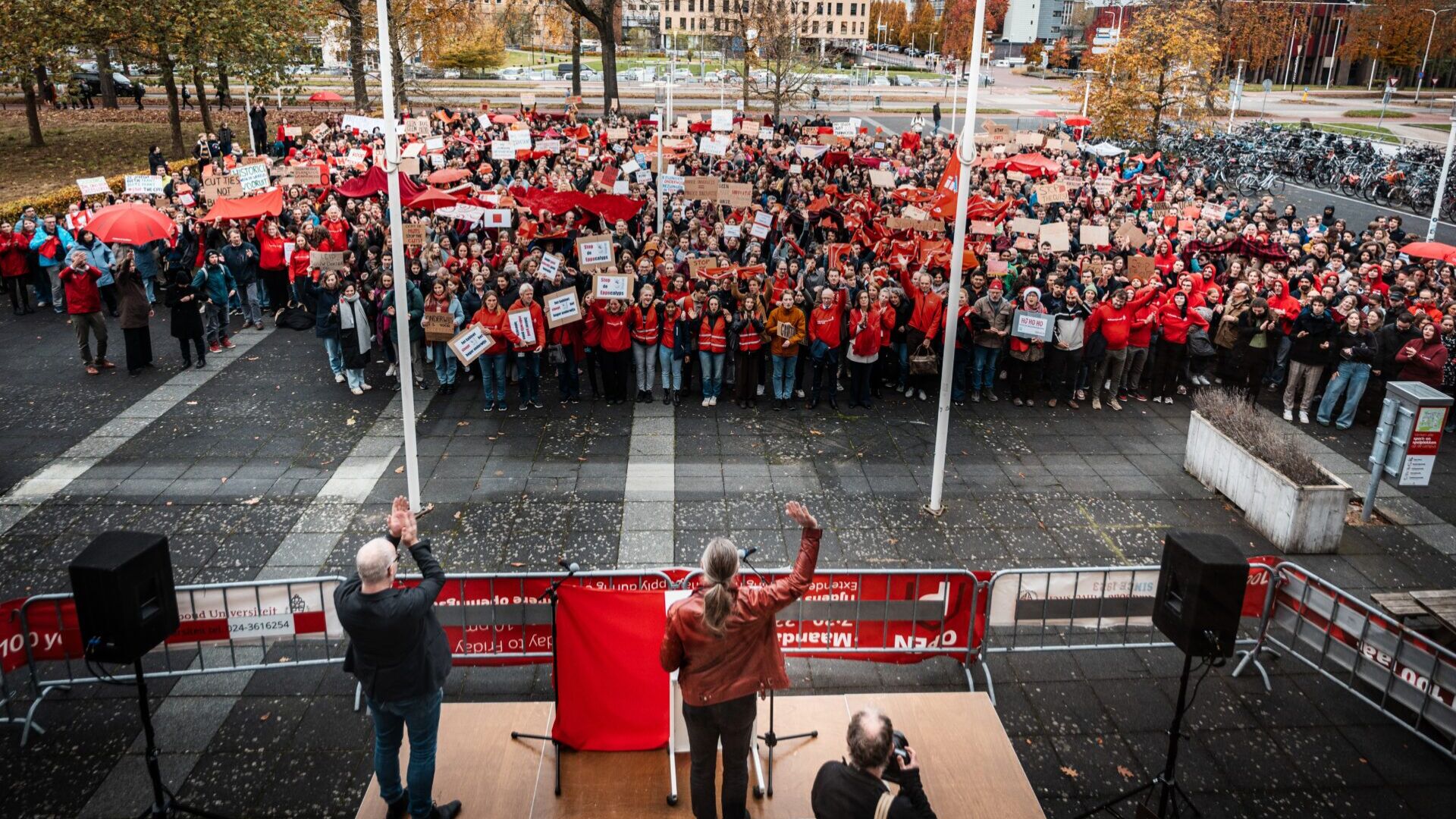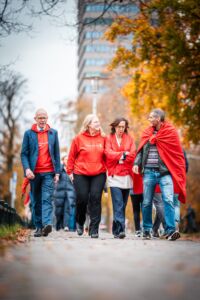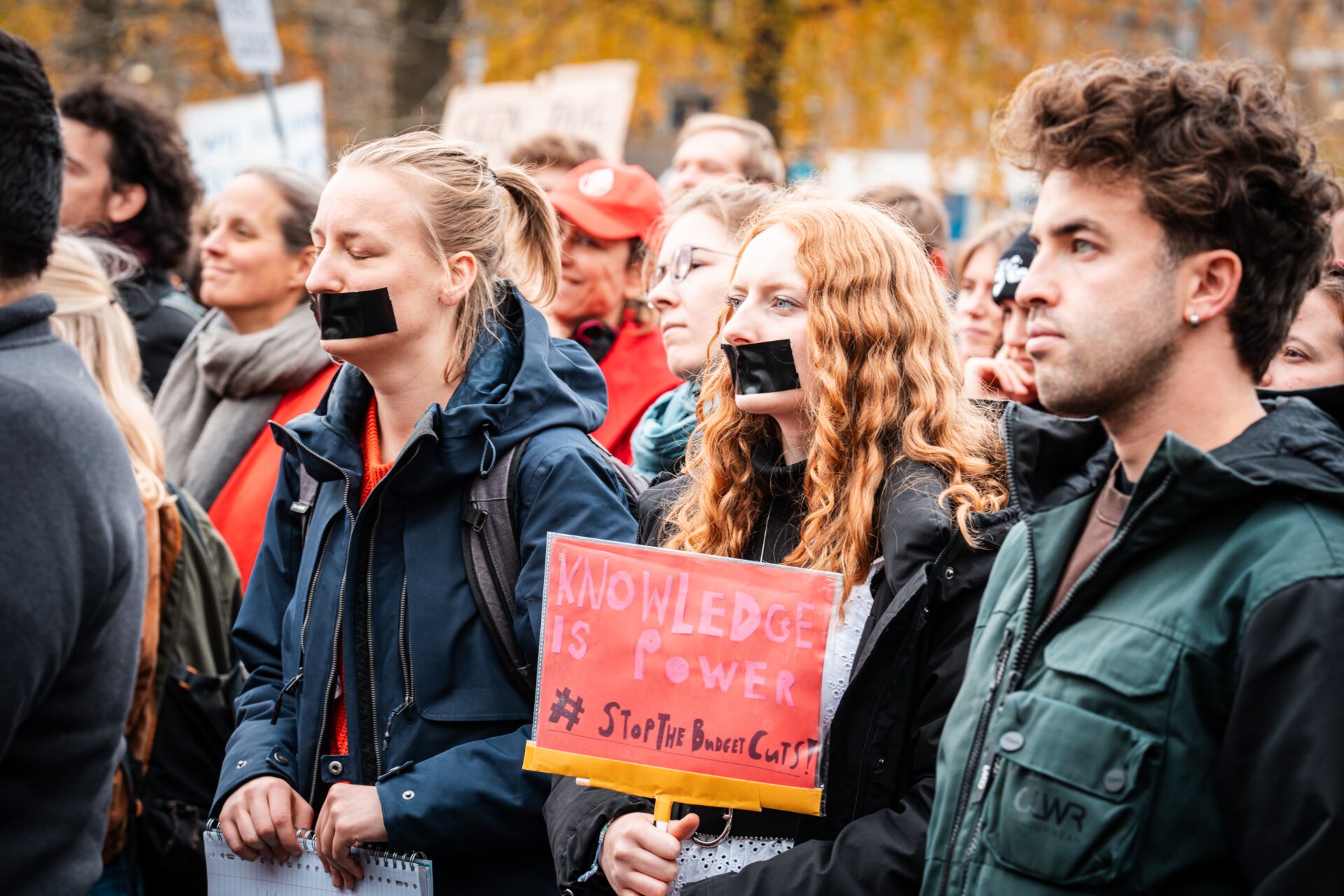Unanimous response on Nijmegen campus: ‘Stop cuts to higher education’
-
 Foto: Johannes Fiebig
Foto: Johannes Fiebig
After the nationwide action in Utrecht was cancelled by the trade unions, the square in front of the Linnaeus Building was filled with protesters on Thursday. The unanimous call: reverse the cuts to higher education. The next action is scheduled to take place in two weeks at the Malieveld in The Hague
‘I would like to thank the mayor of Utrecht,’ says university lecturer Willem Halffman into the microphone. ‘Thanks to your cancellation, our group is bigger than ever, we’re more well-known than ever, and now twice as many people will be going to The Hague.’
The sociologist of science and leader of the activist group WOinActie is addressing around 1,500 students and staff this afternoon. They are all from Nijmegen, people who have taken time off from work at Radboud or HAN to gather in front of the Linnaeus Building. Their message: reverse the cuts to higher education.
The government announced plans to cut 1 billion euros. According to Halffman, this is partly because the findings that scientists are spreading are not to the liking of current politicians. The alarming news about climate change, the decline of biodiversity, and exploitation in the labor market is not welcome. ‘Politicians are also not interested in the solutions we offer,’ he says into the microphone, addressing the crowd.
Mira Vegter from the ethics in healthcare department has come from the medical faculty and fully agrees with Halffman. ‘We need to make progress on topics like the climate, racism, and democracy,’ she says. ‘Not regress.’
Don’t be nuts
The protest this afternoon was organised in some hurry after the education unions decided on Wednesday to cancel the large-scale nationwide demonstration. The reason was an urgent advise from Utrecht mayor Sharon Dijksma: pro-Palestine protestors were expected in Utrecht, and the safety of the protesters could not be guaranteed.
Many Nijmegen residents who had planned to travel to Utrecht are now on the square in front of the Linnaeus Building to have their voices heard. Similar last-minute actions were organised in fourteen other university cities.
Attendees are holding up signs with slogans such as “No teachers, no future,” “Historians think the world forward,” and “Don’t be nuts, stop the cuts.”
Around 150 staff members from the Arnhem and Nijmegen University of Applied Sciences (HAN) are present. ‘We’ve had a shortage of teachers and lecturers for decades,’ says Erica Koldenhof, chair of the student participation council at the Academy of Education. ‘It keeps increasing. Good education is the foundation of a society where people can live together well. That’s why we’re here.’
‘Education is an essential part of society,’ says Lotte Schippers, a staff member from library services. ‘If you start tampering with that, you’re tampering with the cornerstone of society. This doesn’t only affect current students, but also the future of the Netherlands.’
Or as history student Mo Quirijnen from the student union AKKU puts it on stage: ‘We are the next generation of working people.’ He criticises the government for treating students as a separate category of citizens, detached from society. ‘As if we live in an ivory tower.’
Students are simply the children of construction workers, social workers, and teachers, he says into the microphone. Due to the cuts and the looming long-term student penalty the government wants to impose, it’s becoming even more difficult for children from lower socio-economic backgrounds to start a degree. ‘If your parents can’t help you pay for it, it’s unaffordable.’
Brute force
Daniël Wigboldus addresses the crowd in a red Radboud hoodie. He explains that every euro invested in education pays off. ‘Through thinking about ageing, affordable healthcare, migration, and geopolitical developments, universities help move the Netherlands forward,’ he says. It would be a shame to cut all the accumulated knowledge, brought together in programmes and institutes, ‘with brute force,’ according to the university administrator.
While, according to the mayor of Utrecht, the nation-wide protest in Utrecht was at risk of being hijacked by pro-Palestine activists, this was not the case in Nijmegen on Thursday. One person starts shouting ‘cut the ties’ as president of the university’s executive board Wigboldus leaves the stage following his speech, but is quickly silenced by bystanders.
As the square empties and everyone returns to their workplaces, Halffman lets out a deep sigh. ‘You’re my Napoleon,’ says a professor who comes to thank him. Halffman replies, ‘What I felt today was solidarity. This promises a lot for the demonstration in The Hague in two weeks.’





